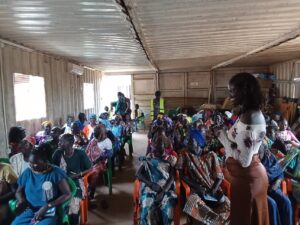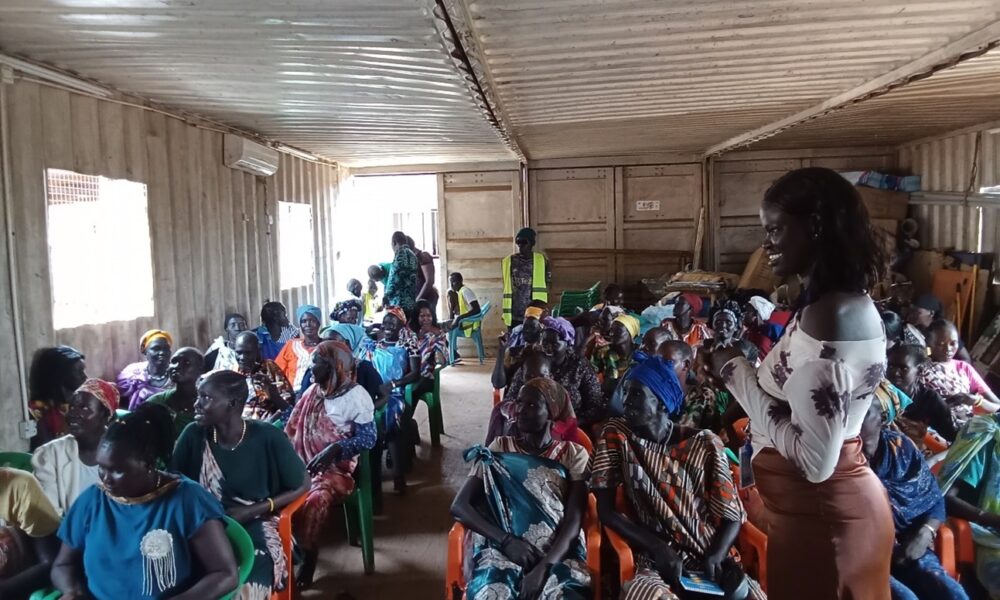
By Lodu William Odiya
In the heart of the Protection of Civilians (PoC) site in Juba, a new dawn is unfolding as women gather to chart their path toward inclusive governance and democratic transition in South Sudan.
For past years, women across the country have faced significant challenges to their participation in leadership and decision-making, but through mentorship and dialogue, new spaces are opening up for their voices to be heard and their leadership strengthened.
Under the theme ‘Empowered Women Can Develop the Nation,’ Active Citizen South Sudan (ACSS), with support from LM International, convened a Women-to-Women Dialogue this week in Juba to promote women’s participation in governance and the democratic transition. This is an engagement forum for local women and Women national parliamentarians in Juba, Central Equatoria State.
Nyakuol Wicjiak, Project Officer at ACSS, said the dialogue was undertaken to empower women and enable them to contribute to decision-making in their communities.
“We brought these mothers together so that they leave here with more than just information. We want them to leave empowered, confident, and ready to claim their rightful place in governance and community decision-making,” she explained.
“When women are informed and strengthened, they can help shape a more inclusive and stable society” Wicjiak added.
The dialogue attracted at least 40 women, including young mothers, who received mentorship from women members of National Parliament who were part of the event.
The exchange offered practical tools, inspiration, and a safe space for women within the PoC to reflect on their role in shaping the future of South Sudan.
Naboth Matai Ngop, Chairlady of the Women in Business in PoC 3, said the dialogue was eye-opening for young mothers, helping them understand and claim their rights.
“This training is going to help us in terms of leadership. It will help us identify the gaps we face as women and find ways to advocate for our rights as women in governance and decision-making spaces,” she said
“In this camp, we have been given titles but not the powers to lead. Through this engagement, we now know our rights in governance and the democratic process, including the affirmative action provisions in the peace agreement that many of us had never heard about before,” Ngop concluded.
According to the 2018 Revitalized Agreement on the Resolution of the Conflict in South Sudan (R-ARCISS), women’s affirmative action was set at 35 percent, to be implemented at all levels of governance.
In her presentation, the mentorship from women MPs and facilitators gave them courage to demand and push for meaningful inclusion.
Historically, women in the PoC sites have faced challenges of symbolic representation without real authority or influence. But participants agreed that this dialogue signaled a shift to transform the pattern.
Nyaradio Gatkuoth Wan, one of the attendees, said that although women were not always recognized in the community, such dialogues would contribute to meaningful improvements and community betterment.
“If women and men share ideas and make decisions together, the community will be more peaceful and stable. Women bring good ideas, and when they are part of the decision-making, even crime can reduce,”.
Wan called on ACSS to continue the initiative, so that more women could be enlightened.
“Empowered women can develop the nation, because we are the ones raising the children and keeping the families together. If we are empowered, society will change,”
Nyibol Buom, another participant remarked “This dialogue is breaking the silence.
For the first time, we feel we are not just listeners we are leaders in the making.”
The women participants committed themselves to using the knowledge gained to push for greater representation and accountability, both inside the PoC and in broader community processes.
For ACSS, this was more than a one-time training. It was the beginning of a movement to equip women with the tools, networks, and courage to influence governance across the country. The beneficiaries applauded both ACSS and LM international for bringing together women parliamentarians and grassroots women for the life changing dialogue, with strong sense of inclusion.
The dialogue was not just about knowledge but shifting power dynamics. Participants committed to using their new skills to advocate for genuine representation, both in the camp and in the wider political process.




